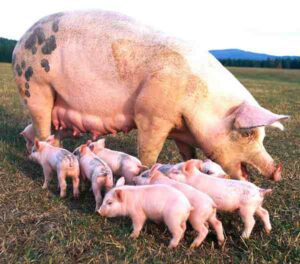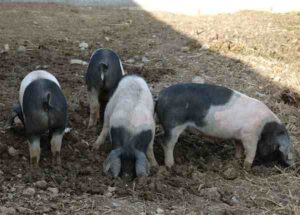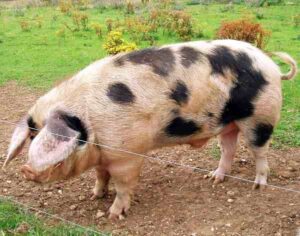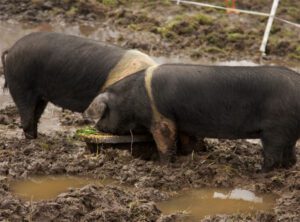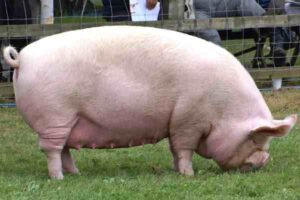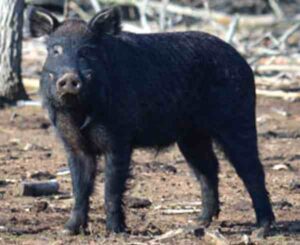The Berkshire pig is a rare breed of domestic pig originating from the Berkshire county of United Kingdom.
Currently it is listed as vulnerable, and as of 2008, fewer than 300 breeding sows were known to exist. Although herds of the Berkshire pigs are sill maintained by the Rare Breeds Survival Trust in England at Aldenham Country Park, Hertfordshire. And herds of the breed are also maintained by the South of England Rare Breeds Centre in Kent.
Some animals of the breed are also kept in Australia and New Zealand with fewer than a hundred purebred sows are available there now.
The American Berkshire Association established in the United States in 1875, gives pedigrees only to pigs directly imported from established English herds or to those tracing directly back to such imported animals.
The Berkshire pig breed is also bred in Kagoshima Prefecture, Japan under the trademarked name Kagoshima Kurobuta. Read some more information about the breed below.
Origin and History of Berkshire Pig
The Berkshire is a very popular pig breed, and it is known for its delicious meat. The breed was originated in England’s Berkshire county. It was developed around the 17th century.
These pigs were favored by English nobility for their tasty meat and were brought to the United States in the early 1800s. They gained popularity quickly among American farmers mainly for their excellent flavor and meat quality.
Characteristics
Berkshire is a medium to large size pig breed. Modern animals are almost entirely black in color, but the original stock was sandy-brown.
The modern animals have white points on the feet, nose and tail. They have relatively short legs, and have prick ears. And they have a relatively short snout with an upturned nose.
They have dish-shaped face with a large jaw and an inverted nose when observed from the side. Average live body weight of the mature Berkshire pig is around 270 kg, and the boars are much larger than the sows.
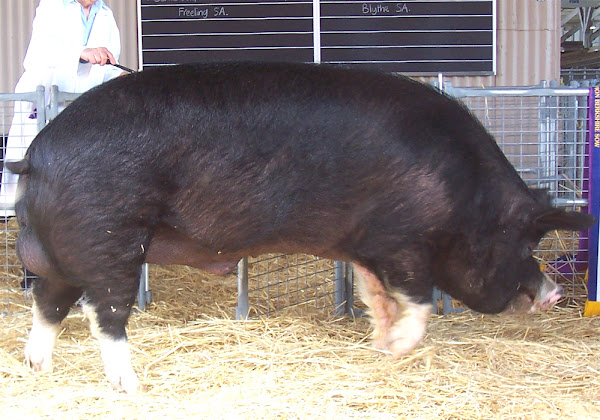
Housing Requirements
Housing requirements of the Berkshire pigs is very simple. They just need a comfortable and safe place to live. They thrive in environments that offer protection from extreme weather conditions (such as hot sun or cold winds). Provide them with sturdy shelters or barns with good ventilation.
Good ventilation system is a must to keep them cool in the summer and warm in the winter. They require clean bedding (such as straw or sawdust) to keep them cozy and dry. Clean their house on a regular basis always try to take good care of your animals.
Dietary Requirements
Feeding the pigs with very good quality and nutritious food is the most important part of raising these pigs. The Berkshire pigs have simple dietary needs, but they require a balanced diet to stay healthy and active.
Their main diet include grains (like corn and barley), as well as protein-rich feeds (such as soybean meal). You can also provide them fresh fruits and vegetables to meet up the necessity of essential vitamins and minerals.
Along with nutritious food, it is also important to provide them with enough clean and fresh water at all times to stay healthy and hydrated. You can also supplement their diet with mineral supplements to ensure they get all the nutrients they need.
Breeding
Breeding Berkshire pigs is very easy and simple, because these pigs are naturally very good breeders. The Berkshire sows generally reach breeding age within their 6-8 months of age. Sows typically go through a heat cycle every 21 days, during which they are receptive to mating.
After successful mating, the sows become pregnant, and the gestation period for Berkshire pigs is around 3 months (or about 114 days). Then the sows give birth to a litter of piglets. Proper care and management is very important during the breeding and gestation periods for ensuring healthy piglets.
Behavior/Temperament
Berkshire pigs are known for their friendly behavior and calm temperament. They are generally docile animals, and they are generally easy to handle and work with.
Health
Berkshire is a very healthy and active pig breed. Maintaining the health of these pigs breed is very important to ensure their well-being and productivity. They are generally hardy and robust animals.
But like all other domestic animals, they can also be susceptible to certain health problems. Providing a clean and hygienic living environment and a balanced diet is key to preventing diseases and promoting good health.
Caring
Taking good care of these animals is very important. And caring for Berkshire pigs involves providing them with a comfortable environment, providing with good quality and nutritious food and some other tasks. Clean their living area on a regular basis.
And doing this will help to maintain hygiene and prevent health issues. Perform regular veterinary check-ups and vaccinations. Doing this can help detect and prevent illnesses early. Common health concerns for Berkshire pigs include respiratory infections, parasites, and issues related to obesity or overfeeding.
Uses
Berkshire pigs are mainly valued for their high-quality and tasty meat. The meat is known for its exceptional flavor and tenderness.
Popularity and Price
The Berkshire pig is gaining popularity throughout the world, mainly due to its excellent meat quality and distinctive marbling. It is very tough to tell the exact price. Please visit some breeders in your area to know more about the current price.
Pros and Cons of Berkshire Pigs
Like many other pig breeds, the Berkshire pigs also have some advantages and disadvantages. Here is a breakdown of the pros and cons of Berkshire pigs:
Pros:
- Excellent meat quality
- Friendly temperament
- Cultural significance
- Fast growth rate
- Worldwide popularity
Cons:
- Higher initial investment
- Health concerns
- Limited availability
Interesting Facts
Here are some interesting facts about Berkshire pigs:
- Berkshire pigs are famous for their delicious meat. Their meat is juicy, tender, and flavorful.
- Many chefs and food enthusiasts throughout the world prefer Berkshire pork for its high quality and rich taste.
- These pigs were once favored by English nobility for their exceptional meat quality.
- They were even kept on the grounds of Windsor Castle during the reign of King Henry VIII.
- They have distinctive black bodies with white markings (usually on their feet, face, and tail).
- These pigs are known for their friendly and calm temperament. They are gentle animals and they are easy to handle.
- Berkshire pigs have a long history (dating back to the 17th century in England).
- They were brought to the United States in the early 1800s and have since become one of the most popular heritage pig breeds.
- Berkshire pigs are mainly raised for their high-quality meat. They are also valued for using in breeding purposes and are sometimes kept as pets or for educational purposes.
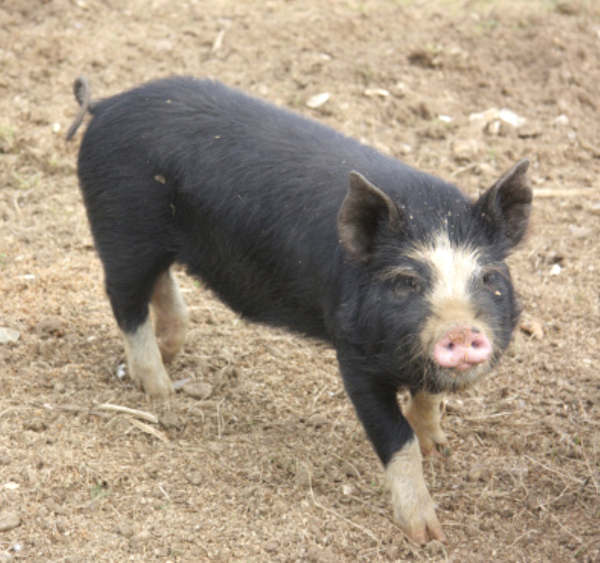
Special Notes
The Berkshire pigs are intelligent animals and they are well suited for the extensive pig farming system. They are well known for their quality meat production.
The Berkshire pork is prized for juiciness, flavor and tenderness, is pink-hued and heavily marbled. The meat is rich in high fat content which makes it very suitable for long cooking and high-temperature cooking.
The Berkshire pig is relatively a fast grower pig. And it takes between 180 to 195 days from birth for reaching the marketing weight of around 113 kg. However, review full breed profile of this pig breed in the following chart.
| Breed Name | Berkshire | |
| Other Name | None | |
| Special Notes | Intelligent, well suited for extensive pig farming system, known for their quality meat production, grow relatively faster | |
| Breed Size | Medium to large | |
| Boars | Up to 270 kg | |
| Sows | Around 270 kg | |
| Climate Tolerance | All climates | |
| Color | Almost entirely black with white points on the feet, nose and tail | |
| Rarity | Rare | |
| Country/Place of Origin | United Kingdom |
Frequently Asked Questions (FAQs)
People ask many questions about Berkshire pig. Here we are trying to list the most common questions about this pig breed, and trying to answer them. Hope you will find your answer. Don’t hesitate to ask us if you have more questions.
Is Berkshire pig farming profitable?
Yes, raising Berkshire pigs for making profits is very profitable. You can raise this breed for making good amount of profits.
Is Berkshire a good meat pig?
Yes, the Berkshire is a very good meat pig breed. The breed is highly regarded for it’s tender, juicy and flavorful pork. And the Berkshire pork is heavily marbled with fat.
What is Berkshire pork called in Japan?
The Berkshire pork is know as Kurobuta pork in Japan.
Are Berkshire pigs friendly?
Yes, the Berkshire pigs are very friendly and sociable. They are easy to care and can be raised with other pig breeds, if you wan to do so.
What are cons of Berkshire pigs?
Main problem or disadvantages of the Berkshire pigs are:
- Less or poor food to meat conversion ratio;
- Fatter carcasses;
- Slower grains etc.
Which is better Duroc or Berkshire pork?
There are actually little or no differences in meat color and tenderness. But Berkshire was less than Duroc in drip loss. Berkshire accumulated more subcutaneous and abdominal fat and had small loin eye muscle area, but accumulated less intramuscular fat than Duroc.
Why is Berkshire pork so good?
The Berkshire pork is good and renowned for it’s richness, texture, marbling, juiciness, tenderness and overall depth of flavor.
Do Berkshire pigs make good bacon?
Yes, Berkshire pork make good bacon. Berkshire pork bacon is mouthwateringly buttery, and you will be amazed at it’s tenderness, low saltiness and all-around intense pork flavor.
How much is Berkshire pork worth?
Price of Berkshire pork is pretty high. Berkshire pork is not widely available, so it is highly prized. Retail prices typically range anywhere from $14 to $30 a pound. But actual price depend on the cut.
How much land does a Berkshire pig need?
Generally, a Berkshire pig require around 8 square feet of housing space.
What is the lifespan of a Berkshire pig?
Average lifespan of a Berkshire pig is between 6 and 10 years.
How long does it take to grow out a Berkshire pig?
From birth to a 250 lb. market weight, the average Berkshire hog will require approximately 180 to 195 days.
Is Berkshire pork healthier?
The Berkshire pork is high in protein, minerals and vitamins. So, it can be an excellent addition to a healthy diet.
Is a Berkshire pig rare?
Yes, Berkshire is a pretty rare breed of pig.
What do you feed a Berkshire pig?
The Berkshire pigs are just like most other pig breeds. You can feed them rice, wheat, oats, barley, peas, fruits, vegetables and different types of greens.
Can you raise Berkshire pigs on pasture?
Yes, sure! You can raise these pigs on pasture.
Are Berkshire pigs easy to raise?
Yes, like most other pig breeds, raising the Berkshire pigs is fairly simple and easy.
What weight should I butcher a Berkshire pig?
The Berkshire pigs are generally sold when they reach around 265 pounds of body weight.
How big do Berkshire pigs grow?
The Berkshire pigs can become very large. They can reach as much as 1,000 pounds when full grown.
What are the characteristics of Berkshire pig?
The Berkshire is medium-sized and predominantly black in color, with white on its face, legs, and tip of tail. It has a short dished face with erect ears pointing slightly forward. The breed is used for fresh pork production in England, Japan, North and South America, and other areas worldwide. Average body weight of the mature pigs is around or up to 270 kg.
